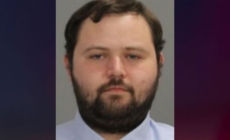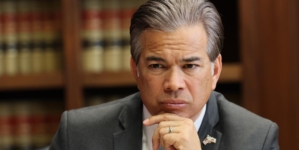-
Justice Elena Kagan warns Supreme Court just “all but overturned” 90-year precedent - 13 mins ago
-
Man arrested in 1993 cold case death of victim found in basement with blunt force trauma to his head - 19 mins ago
-
2025 College Football Odds: Chris ‘The Bear’ Fallica’s expert picks, best bets - 28 mins ago
-
Bet365 Bonus Code WEEK365: Claim $150 MLB, Dream-Mercury, 3M Open Bonus - 58 mins ago
-
Doctor pleads guilty in Matthew Perry ketamine distribution case - about 1 hour ago
-
Texas man sentenced for sneaking firearm into workplace and fatally shooting 1 person - about 1 hour ago
-
Drew Allar on his expectations for Penn State and growth in final season | The Herd - about 1 hour ago
-
Coffee ring effect inspires breakthrough 12-minute at-home disease test - 2 hours ago
-
Five Things Causing Electricity Prices to Spike - 2 hours ago
-
Man who killed teen at birthday party and claimed he could become a ‘cartel assassin’ sentenced to life - 2 hours ago
Newsom redistricting threat fits a pattern of ignoring voters
In 2010, California voters drove the foxes from the henhouse, seeing to it that lawmakers in Washington and Sacramento would no longer have the power to draw congressional districts to suit themselves.
It wasn’t close.
Proposition 20 passed by a lopsided 61%-to-38% margin, giving congressional line-drawing authority to an independent mapmaking commission and thus ending decades of pro forma elections by injecting much-needed competition into California’s House races.
Now, Gov. Gavin Newsom is talking about undoing voters’ handiwork.
Newsom said he may seek to cancel the commission, tear up the boundaries it drew and let Democratic partisans draft a new set of lines ahead of next year’s midterm election — all to push back on President Trump and Texas Republicans, who are attempting a raw power grab to enhance the GOP’s standing in 2026.
The threatened move is a long shot and, more than anything, a ploy to boost Newsom’s White House ambitions.
It’s also highly presumptuous on his part, reflecting an increased arrogance among lawmakers around the country who are saying to voters, in effect, “Thank you for your input. Now go away.”
Take what just happened in Missouri. Last year, 58% of voters approved a ballot measure increasing the state minimum wage and requiring employers to provide paid sick leave. This month, Republican Gov. Mike Kehoe signed legislation that limited the minimum wage increase and scrapped the sick leave requirement altogether.
In two other states, Alaska and Nebraska, lawmakers similarly tried but failed to, respectively, overturn voter-passed measures on paid sick leave and a hike in the minimum wage.
“It’s a damning indictment of representative democracy when elected officials are scared of the will of their own voters,” said Alexis Magnan-Callaway of the Fairness Project, a union-backed advocacy group that focuses on state ballot measures.
It is indeed.
But it’s part of a pattern in recent years of lawmakers, mainly in Republican-led states, undercutting or working to roll back voter-designed measures to enshrine abortion rights, expand Medicare and raise the minimum wage.
To be clear, those measures were passed by voters of all stripes: Democrats, Republicans, independents.
“People are transcending party lines to vote for issues that they know will impact their communities,” said Chris Melody Fields Figueredo, executive director of the Ballot Initiative Strategy Center, a progressive organization. By ignoring or working to nullify the result, she said, lawmakers are helping contribute “to what we’re seeing across the country, where people are losing faith in our institutions and in government.”
And why wouldn’t they, if politicians pay no mind save to ask for their vote come election time?
In a direct attack on the initiative process, at least nine state legislatures passed or considered laws in their most recent session making it harder — and perhaps even impossible — for citizens to place measures on the ballot and seek a popular vote.
There can be issues with direct democracy, as Sean Morales-Doyle of the Brennan Center for Justice pointed out.
“There can be times when systems can be abused to confuse voters,” he said, “or where voters do things without maybe fully understanding what it is they’re doing, because of the way ballot measures are drafted or ballot summaries are offered.”
But it’s one thing to address those glitches, Morales-Doyle said, and “another thing to just basically say that we, as the representatives of voters, disagree with what voters think the best policy is and so we’re going to make it harder for them to enact the policy that they desire.”
In Texas, Republicans are wielding their lopsided power in hopes of erasing as many as five Democratic-leaning congressional seats, boosting the GOP’s chances of keeping control of the House in the 2026 midterm election. Trump, staring at the prospect of an emboldened, subpoena-wielding Democratic House majority, is backing the effort whole-hog.
That, Newsom said, is the fighting-fire-with-fire reason to tear up California’s congressional map and gerrymander the state for Democrats just as egregiously as Texas Republicans hope to do. “We can sit on the sidelines, talk about the way the world should be. Or, we can recognize the existential nature that is this moment,” the governor asserted.
It’s awfully hard to argue against corralling the errant Trump and his Republican enablers. Still, that’s no reason to ignore the express will of California voters when it comes to reining in their own lawmakers.
Taking Newsom’s gerrymander threat at face value, there are two ways he could possibly override Proposition 20.
He could break the law and win passage of legislation drawing new congressional districts, face an inevitable lawsuit and hope to win a favorable ruling from the California Supreme Court. Or he could call a costly special election and ask voters to reverse themselves and eliminate the state’s nonpartisan redistricting commission, at least for the time being.
It’s a hard sell. One presumes Newsom’s message to Californians would not be: “Let’s spend hundreds of millions of your tax dollars so you can surrender your power and return it to politicians working their will in the backrooms of Washington and Sacramento.”
But that’s the gist of what they would be asked to do, which bespeaks no small amount of hubris on Newsom’s part.
If elections are going to matter — especially at a time our democracy is teetering so — politicians have to accept the results, whether they like them or not.
Otherwise, what’s the point of having elections?
Source link






























